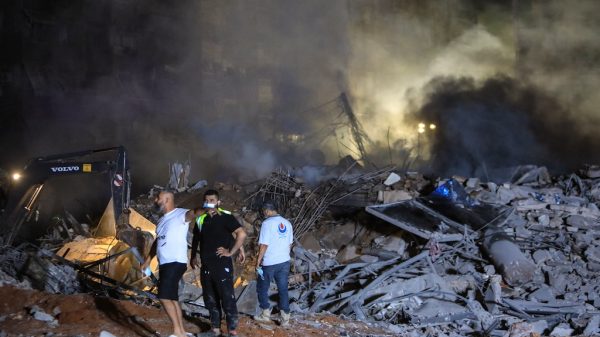Israel strikes Hezbollah bastion in Beirut

Shawdesh Desk:
Israel conducted a wave of air strikes on the south of Lebanon’s capital Beirut on Friday that it said targeted Hezbollah’s headquarters, warning of more to come as it told civilians to leave the densely populated neighbourhood.
Friday’s strikes sent huge clouds of smoke soaring above the area and were heard across the Mediterranean city, sparking panic in the residential area that has been the Iran-backed movement’s main bastion for decades.
They were by far the fiercest strikes to hit Beirut since Israel shifted its focus from the war in Gaza to Lebanon this week, pounding Hezbollah strongholds around the country and killing hundreds of people.
Hezbollah started fighting Israeli troops along the Lebanon border a day after its Palestinian ally Hamas staged its unprecedented attack on Israel on October 7.
Israeli Prime Minister Benjamin Netanyahu vowed in an address to world leaders on Friday that there would be no-let up in the battle against Hezbollah until Israel’s northern border was secured.
‘Oh my God, what strikes. I felt like the building was going to collapse on top of me,’ said Abir Hammoud, a teacher in her 40s who lives in the southern suburbs of Beirut.
Ahmad Ahmad, in his 60s, said he fled his house in the southern suburbs after the strikes, which he said felt ‘like an earthquake’.
Nasrallah ‘fine’
A source close to Hezbollah said the strikes levelled six buildings, and according to a preliminary toll, six people were killed and 91 wounded.
Israeli military spokesman Daniel Hagari said the strike targeted ‘the central headquarters’ of Hezbollah in the southern suburbs of the city.
Israeli television networks reported that Hezbollah chief Hassan Nasrallah was the target of the strike, though the source close to Hezbollah said he was ‘fine’.
Nasrallah enjoys cult status among his Shiite Muslim supporters, is equipped with a formidable arsenal far bigger and more modern than the national army’s, and holds sway over Lebanon’s institutions.
He has rarely been seen in public since his movement fought a devastating 2006 war with Israel, living in hiding to avoid assassination.
After the Beirut strikes, Hezbollah said it had fired more rockets into Israel ‘in defence of Lebanon and its people’.
The Israeli military said a Hezbollah rocket had hit a house and a car in the northern city of Safed but there were no immediate reports of casualties.
Rear Admiral Hagari warned Israel would not allow Hezbollah backer Iran to use Beirut airport to transfer weapons to its ally.
He also said the military would attack ‘in a short while’ three buildings Hezbollah was using to store weapons, calling on residents to evacuate them.
‘The force of the explosions as a result of the missiles which are under the buildings may cause damage to the buildings and even their collapse,’ Hagari said.
Deadliest in a generation
The UN has repeatedly condemned the sharp escalation of violence in Lebanon.
‘We are witnessing the deadliest period in Lebanon in a generation, and many express their fear that this is just the beginning,’ the UN humanitarian coordinator in Lebanon, Imran Riza, said.
In Israel, too, many were weary of the violence.
‘It is incredibly exhausting to be in this situation. We don’t really know what’s going to happen, there’s talk of a ground offensive or a major operation,’ said Lital Shmuelovich, a physiotherapy student.
In New York, Netanyahu also addressed the war in Gaza, saying that Israel’s military would continue to fight Hamas until it achieved ‘total victory’.
Diplomats have said efforts to end the war in Gaza were key to halting the fighting in Lebanon and bringing the region back from the brink of all-out war.
But despite months of mediation efforts, a Gaza ceasefire remains elusive.
Hamas’s October 7 attack resulted in the deaths of 1,205 people, mostly civilians, according to an AFP tally based on Israeli official figures that include hostages killed in captivity.
Of the 251 hostages seized by militants, 97 are still held in Gaza, including 33 the Israeli military says are dead.
Israel’s retaliatory military offensive has killed at least 41,534 people in Gaza, most of them civilians, according to figures provided by the Hamas-run territory’s health ministry. The UN has described the figures as reliable.
Change the rules
The Lebanon violence has raised fears of wider turmoil in the Middle East, with Iran-backed militants across the region vowing to keep up their fight with Israel.
Netanyahu took aim at Iran in his UN General Assembly address, saying: ‘I have a message for the tyrants of Tehran. If you strike us, we will strike you.’
He added: ‘There is no place in Iran that the long arm of Israel cannot reach, and that’s true of the entire Middle East.’
Analysts have said Iran would try to resist being dragged into the conflict.
But following the Beirut strikes, Iran’s embassy in Lebanon said: ‘This reprehensible crime… represents a dangerous escalation that changes the rules of the game.’
Iran’s president, Masoud Pezeshkian, later condemned the strikes, branding them a ‘flagrant war crime’.



























Leave a Reply